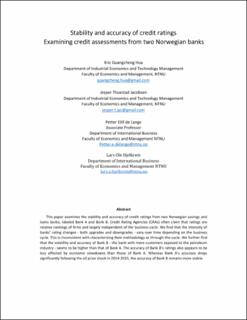Stability and accuracy of credit ratings Examining credit assessments from two Norwegian banks
Peer reviewed, Journal article
Accepted version

Åpne
Permanent lenke
https://hdl.handle.net/11250/2825559Utgivelsesdato
2021Metadata
Vis full innførselSamlinger
Sammendrag
Does the novel technology blockchain conceal properties of an organization that we do not see? This paper suggests that this may be the case. The paper sets out to substantiate a claim that we might be observing the emergence of a loose organization in blockchain. A loose organization can provisionally be defined as a community of blockchain actors who frequently interact with each other and use the spaces between IT silos belonging to centralized organizations and distributed decentralized computer networks to coordinate and innovate the use of data through acts of organizing. In these spaces, blockchain actors engage in activities and practices and coordinate and innovate the use of data in ways that may constitute the groundwork for institution-building processes of blockchain fields. The rationale for posing the concept of loose organizations relates to the fact that blockchain introduces new technological features, algorithmic consensus mechanisms and cryptography, which materializes as a coordination mechanism allowing people and organizations to move digital assets without using intermediates. These innovations turn the Internet into an instrument for transferring values between parties without going through a trusted third party. A new trust protocol, based on blockchain’s record-keeping technology, allows digital assets such as accreditation, intellectual property, and digital identity to be safely and securely transacted through peer-to-peer networks. For such digital assets to be transferred properly, they seem to depend on the organizing acts of actors belonging to loose organizations in blockchain fields. To hypothesize the emergence of loose organizations in blockchain, we apply institutional entrepreneurship from new institutional theory. Empirically, the paper turns its focus on Higher Education Institutions (HEIs), a sector that has little experience with blockchain and struggles with the adoption of digital technologies. In HEIs, blockchain has interesting applications and can be used to make academic credentials transferable and accessible to students, employers, and universities. The paper outlines opportunities and challenges residing in the adoption of blockchain in HEIs.